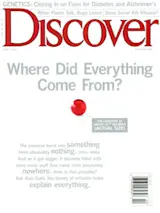Scientists have long believed that Earth's atmosphere contained little free oxygen until 2.3 billion years ago, when the first photosynthetic bacteria evolved. Neil Phillips, a geologist at the Commonwealth Scientific and Industrial Research Organization in Australia, began to doubt the conventional wisdom while studying gold deposits in South Africa. He uncovered what appear to be pisoliths, pellets of iron oxide (above) thought to arise only in the presence of oxygen. But these pisoliths date from 2.8 billion years ago, long before the rise of oxygen-spewing microbes.
Phillips argues that Earth probably had an oxygen atmosphere from the beginning of geologic history. If so, ideas about how life evolved during the first 2 billion years could be wrong. But some of his colleagues propose that the pisoliths could have formed under anoxic conditions, pointing to geologic and experimental evidence against early oxygen. "To my mind, this issue has been solved for ...














